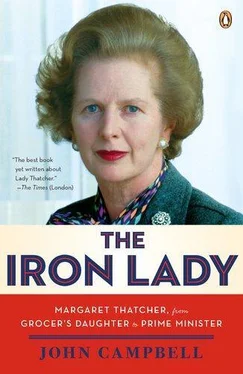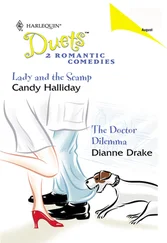The war itself was a formative influence for Margaret Thatcher’s whole generation, yet it affected her in a crucially different way from her male contemporaries. She was not only just too young to fight: she was the wrong sex. She could have joined one of the women’s services when she left school, which would have got her into uniform and closer to the action; but still she could never have gained that first-hand experience of combat which left such a deep and lasting impression on practically all the young men who became her rivals and colleagues in the years ahead. Mrs Thatcher’s experience on the home front – listening to Churchill in the blackout, following the campaigns with little flags on maps – taught her different lessons.
Unlike those who served during or after the war in France, Germany, the Mediterranean or the Far East, Mrs Thatcher never set foot out of England before her honeymoon in 1952, when she was twenty-six. Seen from Grantham, the peoples of the Continent were either odious enemies to be defeated, or useless allies who had to be saved from the consequences of their own feebleness by the British and Americans. By contrast the Americans were cousins, partners, friends: powerful and generous, the saviours of democracy, champions of freedom, prosperity and progress. Nor was this a merely abstract admiration: from 1942 onwards there was a large presence of American airmen stationed at bases around Grantham. Though they excited considerable interest among the local girls, there is no record that any of them tried to take up with Margaret Roberts. She never had much time for that sort of thing. But she saw the Americans around the town, noted the spending power they brought to the local economy, and could hear them flying out each day to bomb Germany.
We are dealing with simplistic stereotypes here. But there can be no doubt that Mrs Thatcher’s instinctive and lifelong belief in the Atlantic alliance as the first principle of British foreign policy, and her equally instinctive contempt for the continental Europeans, both derived from her particular experience of the Second World War – an experience unique among British politicians of the post-war era. It is impossible to overemphasise the significance of this gulf of perception. It was not just her sex which made Mrs Thatcher different: the most important consequence of her sex was her lack of military experience.
Though she did not sit her Higher School Certificate until 1943, she had already received offers from both Nottingham (‘our local university’) and Bedford College, London, before the end of 1942. However, she was determined, with Alfred’s support, to try for Oxford. (‘I regarded it as being quite simply the best, and if I was serious about getting on in life that is what I should always strive for…I was never tempted to opt for Nottingham.’) 21So she sat a scholarship exam in December 1942. She narrowly missed the prize (she was, as she points out in her memoirs, only seventeen); but she was offered a place at Somerville College, Oxford, for October 1944. The lost year was important since, under wartime regulations, unless she went up in 1943 she would only be allowed to take a two-year degree before being called up for National Service. Still, it was a considerable achievement to have won a place.
With a university place secured, but a year to fill before she could expect to take it up, the natural thing for a patriotic eighteen-year-old in the middle of the war might have been to do as many of her contemporaries had already done and join one of the women’s services; or, if that would have committed her for too long a period, at least find some other form of war work while she waited to go to Oxford. It is a little odd that she chose instead to go back to school for another year.
The autumn term began in August, three weeks early to allow an October break for potato picking. Just three weeks into the term, however, there came a telephone call from Somerville: a vacancy had arisen – another girl had presumably decided that she had more compelling priorities – so Miss Roberts was offered the chance to take up her place immediately. She therefore left KGGS in the middle of the term, left home and Grantham and went up to Oxford in October 1943, with the opportunity, after all, to enjoy a full three years.
Going to Oxford was the great opportunity which changed Margaret Roberts’ life, opened doors to her and set her on the way to a political career. Yet Oxford was not for her, as it was for so many others, a golden period of youthful experiment and self-discovery. In the four years she eventually spent there she made no lasting friendships, underwent no intellectual awakening. She did not light up the university in any way: none of her contemporaries saw her as anything remarkable, still less picked her as a future Prime Minister. Yet she was already more than half-determined to go into politics and used her time at Oxford quite deliberately to make connections which would be useful to her in years to come. The fact that no one noticed her was largely a function of her sex: Oxford in the 1940s was still a predominantly male society. The Union, in particular, was barred to women, who were obliged to confine their political activity to the less glamorous back rooms of the Conservative Association and the Labour Club. But even within the Conservative Association Margaret Roberts seemed no more than diligent. The most remarkable thing about her Oxford career, in fact, was how little the experience seemed to change her.
Admittedly, Oxford in wartime was a shadow of its normal self. There were more women than usual and fewer young men; rather than giving the women more opportunity to shine, however, the men’s absence seemed to drain the place of much of its energy. Margaret was given rooms in college, but was slow to make friends. ‘Yes, I was homesick,’ she admitted to Patricia Murray.‘I think there would be something very wrong with your home life if you weren’t just a little.’ 22She gradually filled her rooms with familiar pictures and bits of furniture brought from home.
Her principal antidote to loneliness was work; but in some ways this only increased it. Chemistry is an unsociable course of study, involving long hours alone in the laboratory: years later she recalled that science was ‘impersonal’, compared with arts subjects which gave more opportunity for discussion and debate. 23She was probably already beginning to regret having chosen chemistry; but she stuck at it conscientiously and she was more than competent at it, combining as she did a clear mind with an infinite capacity for taking pains. In her third year she devoted more of her time to politics and less to work. Had she dedicated herself single-mindedly to getting a first she might – by sheer application – have succeeded. As it was she won a university essay prize, shared with another Somerville girl. But she was not so single-minded. Moreover she was ill during her final exams. In the circumstances she did well to take a solid second. It was good enough to allow her to come back for a fourth year to do a B.Sc.
Outside her work, her most active commitment in her first two years was the John Wesley Society. This was a natural refuge for a shy provincial girl of Methodist upbringing, an opportunity to meet people like herself with similar habits and assumptions. She attended the Wesley Memorial Church on Sundays, and her social life revolved around the Methodist Study Group and tea parties run by the Students’ Fellowship. It would be easy to conclude that the reassuring familiarity of Methodism was simply a comfort blanket while she found her feet: ‘a sober but cheerful social life’, as she put it, ‘which I found the more valuable in my initially somewhat strange surroundings’. 24But she took it more seriously than that. The Wesley Society used to send its members out in pairs to preach in the surrounding villages – exactly as Alfred preached in the villages around Grantham. Margaret readily joined in this activity. Fifty years later, a Somerville contemporary and fellow Methodist clearly remembered a sermon she preached on the text ‘Seek ye first the Kingdom of God; and all these things shall be added unto you’, which was regarded by all who heard it as ‘outstanding’. 25No doubt it owed a lot to Alfred; but it should not be forgotten that when, much later, she was invited to expound her faith from a number of famous pulpits, she had done it before. She was a preacher before she was a politician.
Читать дальше












